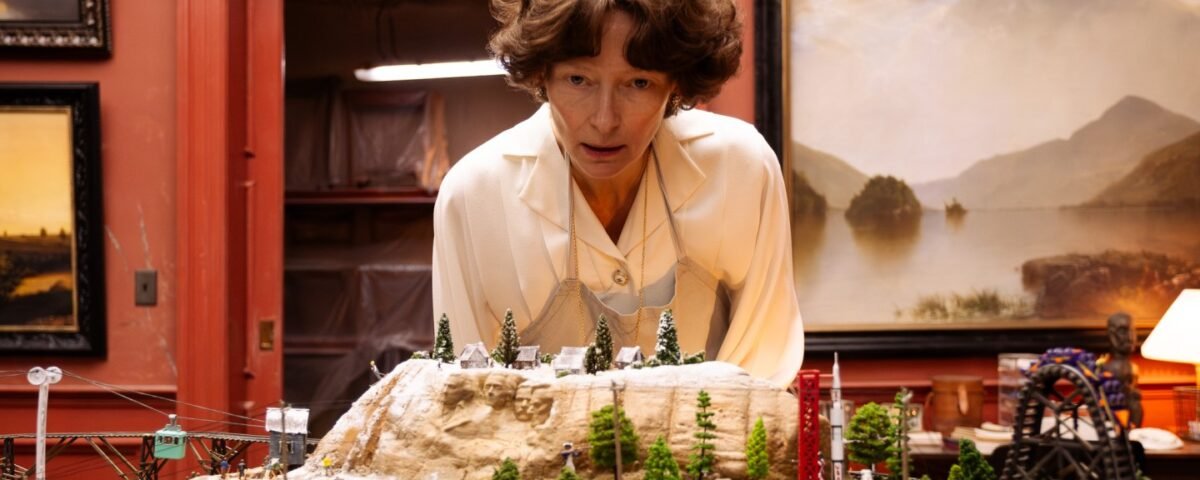


‘Saturday Night’ Review: Jason Reitman Chronicles the Lead-Up to the First ‘SNL’ Show in Alternately Fresh and Frustrating Fashion
September 12, 2024


‘The Brutalist’ Review: Adrien Brody Is Devastating in Brady Corbet’s Monumental Symphony of Immigrant Experience
September 13, 2024The last family on Earth finds their careful facade disrupted by a stranger in this narrative debut from the documentarian, also starring George MacKay and Moses Ingram.
The End
Striking vision, shaky execution.
In December 2023, a report came out that Meta CEO Mark Zuckerberg was building a sprawling underground bunker on a secluded stretch of ranch land on the Hawaiian island of Kauai. The project is shrouded in layers of NDAs, but it’s supposedly 5,000 square feet and will have its own energy and food supplies. When the end of civilization comes, Zuckerberg, like many billionaires, will be sheltered from impact.
In Oppenheimer’s striking feature narrative debut, it’s a combination of all the above. The Act of Killing director uses an allegorical family to probe a different kind of psychological violence, one padded by the illusory comfort of money. Mother (Tilda Swinton), Father (Michael Shannon) and Son (George MacKay) live in a Zuckerberg-like bunker 25 years after an environmental catastrophe has left the Earth uninhabitable. Their routines, observed early in the film, include a communal breakfast, learning piano (Mother), building a miniature model of the old world (Son), emergency drills (everyone) and rearranging the expensive art (Mother, again) in the parlor. Through these moments, Oppenheimer tours the palatial bunker that he constructed with production designer Jette Lehmann. Each room, with its harsh, bright lighting and ornate decorations, reflects the family’s delusions.
When the two men convene, Mother, haunted by nightmares about abandoning her family, frets about the paintings (mostly landscapes of once verdant plains) or talks to her friend (Bronagh Gallagher), who also doubles as the cook. Everyone in the bunker, including the Butler (Tim McInnerny) and Doctor (Lennie James), shapes their existence around keeping the truth of their pasts from Son.
The End opens with humorous observations of how the family maneuvers this intricate obfuscation. Oppenheimer introduces music immediately: A strained ballad between Father, Son and eventually Mother signals the kind of songs that will be featured. The director wrote the lyrics for each number (Josh Schmidt composed the music) and most of them are somber and melancholic. This is, after all, a musical about the end of the world. But pay attention to when, and about what, the characters sing. The lyrics aren’t particularly memorable, but they do reveal how music facilitates their avoidance of reality.
This allergy to difficult feelings is most apparent when Girl (Moses Ingram) enters the bunker. Her presence disrupts the carefully curated existence of the family, especially as she and Son start to fall in love. Coming from the outside world, Girl carries the weariness and curiosity of a survivor. She asks questions and attempts, often unsuccessfully, to bring up emotional topics.
As Girl tries to find her place, her interactions with the family heighten the stakes of this sparsely plotted story. She begins as a mirror, forcing them to reflect. It’s no spoiler to say the family rejects what they see. Slowly, however, she adopts their manners and starts to accept their version of reality.
Deeply committed performances from the cast are a major strength of The End. They sing, dance and leap (with choreography by Sam Pinkleton and Ani Taj) around the bunker trying to dodge accountability through increasingly histrionic songs. MacKay’s portrayal of an overly sheltered adult is particularly compelling, as is Ingram’s slow transformation into a hollowed-out version of herself.
The End requires complete submission to the off-kilter rules that govern this family and to Oppenheimer’s ambitions to radicalize the musical genre. It’s an admirable if uneven endeavor. The choice to tell this story as an allegory proves limiting in the film’s second act, which, after an energetic start, languishes. Without more details about the characters, investment in their post-apocalyptic playground wanes.





